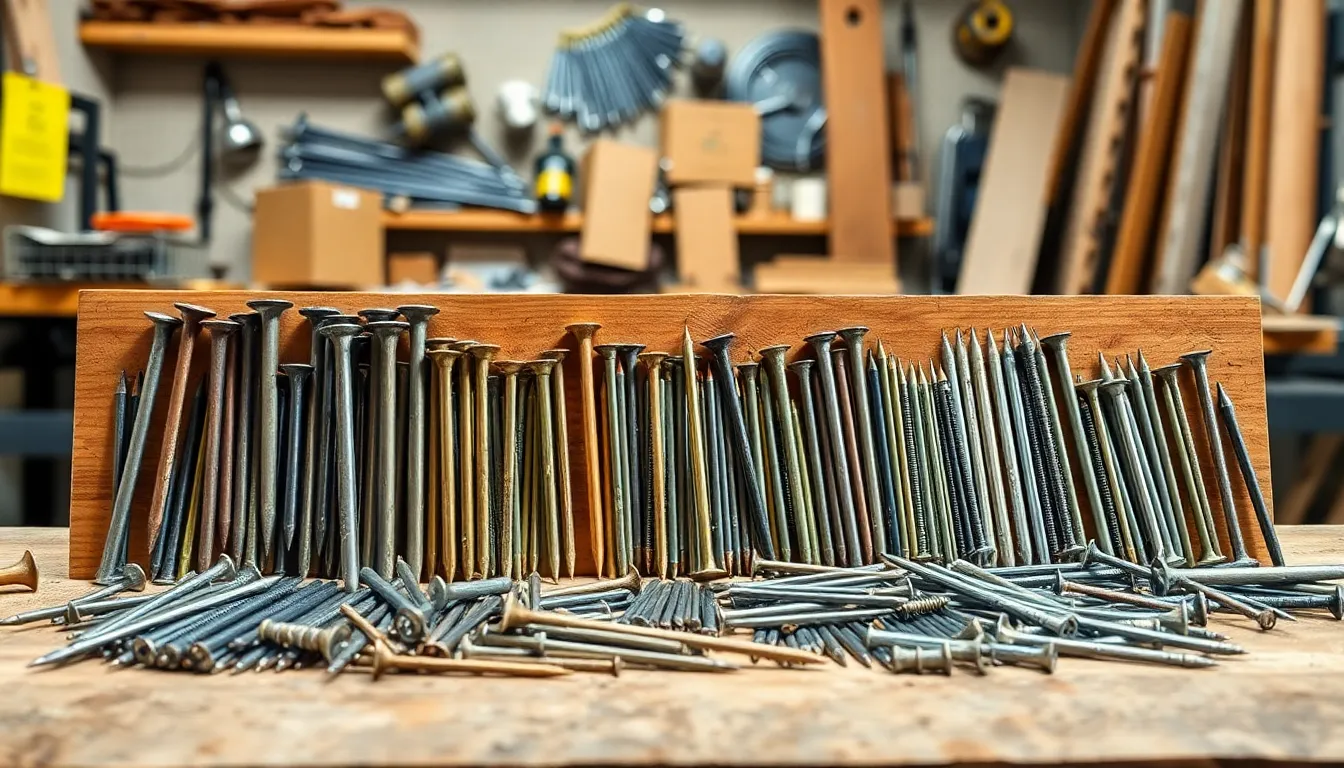Table of Contents
ToggleNails might seem like the unsung heroes of the hardware world, but don’t let their small size fool you. These little metal wonders are the backbone of countless DIY projects, from building furniture to securing that wobbly shelf that’s been giving you the side-eye. Without them, your home improvement dreams would be nothing more than a pile of wood and a lot of frustration.
Whether you’re a seasoned carpenter or just someone trying to hang a picture frame without it crashing down, understanding the different types of nails can save the day. With so many options out there, choosing the right nail can feel like picking the perfect avocado at the store—daunting but oh-so-satisfying when you get it right. Dive into the world of hardware nails and discover how these tiny tools can make a huge difference in your projects.
Overview of Hardware Nails
Hardware nails serve as fundamental fasteners in various construction and DIY projects. These nails come in numerous types, each designed for specific tasks, enhancing the efficiency and stability of the materials they bind. Common types include box nails, finishing nails, and masonry nails, each varying in length, thickness, and design to cater to different applications.
Finishing nails exhibit a small head that allows for a clean and polished appearance in woodworking. Box nails provide a robust fastening solution for framing and general construction tasks. Masonry nails, equipped with a hardened shaft, penetrate dense materials like concrete and brick effectively.
Materials for hardware nails often include steel, stainless steel, or galvanized finishes. Steel nails offer strength for heavy-duty projects, while stainless steel nails resist corrosion, making them suitable for outdoor use. Selecting the right material can significantly impact the longevity and durability of the constructed item.
Sizes of hardware nails fluctuate to accommodate various needs. Length varies from 1 inch to over 6 inches, while gauge thickness affects holding power. Choosing the appropriate size plays a crucial role in ensuring the integrity of the project.
In addition, the installation process requires specific techniques and tools. Electric nailers streamline the process, saving time during extensive projects. Manual hammers, however, provide more control for precise placements in intricate work.
Understanding hardware nails and their distinctions facilitates informed decisions during home improvement endeavors. By selecting the right type, material, and size, individuals substantially enhance the outcome of their projects, ensuring lasting results.
Types of Hardware Nails

Understanding the various types of hardware nails enhances project success and durability. Selecting the right nail type ensures strong and secure connections in building endeavors.
Common Nail Types
Box nails excel in framing and structural tasks, providing robust holding power. Their larger heads help resist pull-through, making them ideal for wood-to-wood connections. Finishing nails serve decorative purposes, with slender bodies that minimize splitting and conceal well in wood surfaces. Use them for trim work and cabinetry. Roofing nails feature wide heads, specifically designed for securing shingles to roofs. Their sharp points penetrate materials effortlessly, ensuring weather resistance. Lastly, masonry nails penetrate concrete and brick efficiently, offering a reliable solution for heavy-duty applications.
Specialty Nail Types
Ring shank nails provide superior holding strength in challenging conditions. Their unique design creates friction, resisting withdrawal forces. Flooring nails specifically target hardwood flooring installations, featuring angled heads for precise placement and secure connections. Additionally, galvanized nails prevent rusting, important for outdoor projects exposed to moisture. Ledger board nails are critical for securing decks and other structures to walls. Designed for stability, they resist shifting under load. Finally, concrete nails offer a unique solution for fastening wood to masonry surfaces, featuring hardened tips and a smooth shaft for effortless insertion.
Materials Used in Hardware Nails
Understanding the materials used in hardware nails informs their selection and application in various projects. Each material offers unique characteristics, enhancing specific functionalities.
Steel
Steel nails are the most common type used in construction and DIY tasks. These nails provide high strength and load-bearing capacity. Carbon steel nails, specifically, excel in driving into wood and support structural integrity. They are typically less expensive and readily available; however, they are prone to rust when exposed to moisture conditions. To ensure longevity in outdoor applications, choosing nails with protective coatings becomes essential.
Stainless Steel
Stainless steel nails offer superior corrosion resistance, making them ideal for damp or outdoor environments. These nails contain chromium which forms a protective layer that prevents rust. Professionals often recommend stainless steel nails for marine applications, outdoor furniture, and projects exposed to high moisture levels. While they may cost significantly more than carbon steel options, the longevity and durability they provide can justify the expense in many cases.
Other Materials
Other materials used for nails include aluminum, copper, and specialty composites. Aluminum nails resist rust and are lightweight, making them suitable for roofing tasks. Copper nails offer excellent corrosion resistance, often used in applications where contact with treated wood occurs. Composite materials, incorporating plastic or other polymers, provide non-corrosive options for specific applications. Each alternative material aims to meet particular project needs while enhancing the overall effectiveness of hardware nails.
Applications of Hardware Nails
Hardware nails play a pivotal role in various applications, especially in construction and furniture making. Their appropriate selection impacts durability and overall project success.
Construction
In construction, hardware nails serve as fundamental fasteners for framing and securing structures. Box nails excel in load-bearing applications, providing strong joints in wooden frames. Finishing nails, while offering a more aesthetic solution, facilitate coverage of nail heads in visible areas. Roofing nails designed specifically for securing shingles withstand wind pressure, ensuring weather resistance. For masonry projects, masonry nails penetrate concrete and brick effectively. Their diverse applications often dictate the choice of material—steel, galvanized, or stainless steel—for optimal strength and corrosion resistance. Choosing the right nails guarantees structural integrity and long-lasting results.
Furniture Making
Furniture making relies heavily on various types of hardware nails for assembly. Finishing nails, due to their slender profiles, minimize splitting and leave less visible marks, making them ideal for attaching trim and decorative elements. Box nails provide sturdy connections in larger pieces such as tables and chairs, ensuring stability during use. Specialty nails like upholstery nails add decorative flair while securing fabric and leather to furniture frames. In projects requiring precise alignment, using a pneumatic nail gun enhances efficiency. The right type of nail ensures that the finished product is both aesthetically pleasing and durable, meeting both functional and design needs.
Advantages of Using Hardware Nails
Hardware nails offer numerous advantages in construction and DIY projects. First, their strength ensures secure fastening, making them reliable for both structural and decorative applications. Different types cater to specific needs, so choosing the right nail enhances project integrity.
Cost-effectiveness stands out as another benefit. Using hardware nails often reduces the need for additional materials or fasteners. Quick installation processes, especially when using electric nailers, cut down project time significantly.
Versatility plays a crucial role in their popularity. From securing roof shingles to assembling furniture, nails adapt to various environments and materials. Using specialized nails for tasks like flooring or masonry maximizes performance.
Durability is vital, especially for outdoor projects. Galvanized and stainless steel nails resist rust and corrosion, ensuring long-lasting results. This feature proves essential in maintaining structural integrity over time.
Aesthetic appeal also comes into play. Finishing nails, with their slender bodies, minimize visible marks on finished surfaces. This quality enables projects to maintain a polished appearance without compromising strength.
Finally, the ease of use makes hardware nails accessible for all skill levels. Beginners and seasoned DIY enthusiasts alike can manage nail installations with confidence. Mastering the selection of appropriate nails empowers individuals to elevate their project outcomes.
Choosing the right hardware nails can significantly influence the success of any DIY project. With a variety of types and materials available each serving unique purposes it’s essential to match the nail to the task. This thoughtful selection not only enhances the durability of the project but also improves its overall appearance.
By understanding the characteristics of different nails and their applications individuals can confidently tackle home improvement tasks. Whether framing a structure or crafting furniture the right nails ensure strong and lasting results. Embracing the versatility of hardware nails empowers anyone to elevate their craftsmanship and achieve professional-quality outcomes.







